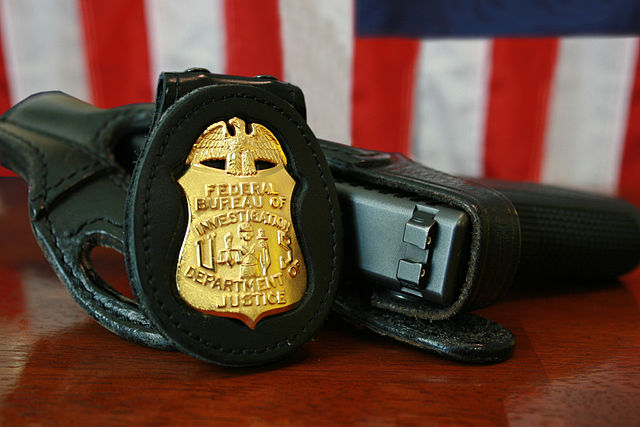 The Committee on the Judiciary and the Select Subcommittee on the Weaponization of the Federal Government in the U.S. House of Representatives released an alarming report of its findings on the FBI’s targeting of certain Catholic Americans they categorized as “potential domestic terrorists.”
The Committee on the Judiciary and the Select Subcommittee on the Weaponization of the Federal Government in the U.S. House of Representatives released an alarming report of its findings on the FBI’s targeting of certain Catholic Americans they categorized as “potential domestic terrorists.”The report, entitled, "The FBI's Breach of Religious Freedom: The Weaponization of Law Enforcement Against Catholic Americans” is the result of a months-long investigation into the issuing of an FBI-wide memorandum originating from the FBI's Richmond Field Office that categorized Catholics who attend the Traditional Latin Mass as “radical-traditionalist Catholics” (RTC’s). This was due to their strong opposition to abortion, gay marriage, and transgenderism which the Agency believed could lead them to become violent extremists. Therefore, the memorandum instructed the FBI to infiltrate Catholics churches as a form of “threat mitigation.”
The case began in February 2023 after whistleblower Kyle Seraphin revealed the existence of the Richmond memorandum in internal FBI systems. In April 2023, after the FBI failed to fully cooperate with House oversight, Chairman Jim Jordan issued a subpoena to Director Christopher Wray, requesting documents related to the memorandum.
As a result, the Committee discovered that the FBI relied on at least one undercover agent to develop its assessment and proposed developing sources among the Catholic clergy and church leadership. Not only did the FBI propose to develop sources, but it already interviewed a priest and choir director affiliated with a Catholic church in Richmond, Virginia for the memorandum.
Thankfully, as the repot states, “Due to the actions of a brave whistleblower, this document was introduced into the public eye largely before it could be acted on. Perhaps most concerning is that without the whistleblower, this document would still be actionable in FBI systems, potentially endangering the religious liberties of countless Americans who might be investigated simply for espousing certain sincerely held views. That is unacceptable and antithetical to the protections of the First Amendment.”
Among the key findings revealed by witness testimony and FBI internal documents in the new report include:
• The documents received pursuant to the Committee's subpoena show there was no legitimate basis for the memorandum to insert federal law enforcement into Catholic houses of worship.
• The basis for the Richmond memorandum relied on a single investigation in the Richmond Field Office's area of responsibility in which the subject "self-described" as a "radical-traditionalist Catholic" (RTC). However, FBI employees could not define the meaning of an RTC when preparing, editing, or reviewing the memorandum. Even so, this single investigation became the basis for an FBI-wide memorandum warning about the dangers of "radical" Catholics.
• Whistleblower disclosures reveal that the FBI interviewed a priest and choir director affiliated with a Catholic church in Richmond, Virginia while preparing the memorandum to inform on the parishioner under investigation.
• In addition to the investigation in Virginia, FBI Richmond relied on reporting from other field offices across the country, including FBI Los Angeles, FBI Milwaukee, and FBI Portland in making its assessment.
• The two FBI employees who co-authored the memorandum later told FBI internal investigators that they knew the sources cited in the memorandum had a political bias—sources including the Southern Poverty Law Center, Salon, and The Atlantic.
• The documents received pursuant to the Committee's subpoena show that the FBI singled out Americans who are pro-life, pro-family, and support the biological basis for sex and gender distinction as potential domestic terrorists. The memorandum recognized "the run-up to the next general election cycle" as a key time frame and cited the Dobbs v. Jackson Women's Health Organization decision that overturned Roe v. Wade as a flash point.
• Without considerable criticism in the wake of the disclosure of the memorandum, the document would have remained in an FBI-wide system. At the time of the memorandum's disclosure, FBI officials were discussing turning the memorandum into an external, public-facing document highlighting the threats of "radical" Catholics. Most concerning, FBI Richmond still desires to convey this information to other field offices about "radical-traditionalist Catholics."
• FBI Richmond's senior leadership saw the memorandum as an opportunity to insert federal law enforcement into places of worship and support outreach efforts to the Diocese of Richmond and other Catholic parishes.
• Following public criticism about the memorandum, FBI Richmond's Special Agent in Charge Stanley Meador met with members of the clergy, including the Most Reverend Barry Knestout, Bishop of the Diocese of Richmond, and a Cardinal of the Catholic Church to mend the FBI's relationship with the Catholic community.
• Whistleblower disclosures to the Committee further reveal that the memorandum was accessible to other field offices across the country. However, the FBI still has no idea how many FBI employees accessed the memorandum before its removal and cannot confirm whether any outreach occurred to Catholic parishes as a result of the memorandum.
The Committee is demanding that the FBI take decisive action to rebuild public trust and are calling for either an apology from the FBI Richmond office or the removal of the employees involved in creating the document.
“The FBI’s Richmond memorandum is a startling reminder that Americans' civil liberties and core Constitutional rights must be vigorously guarded against government overreach, including in this case from an overzealous federal law enforcement agency,” the report concludes.
“While the documents and information received to date help to better understand what transpired, they do not tell the whole story. The Committee and the Select Subcommittee will continue to pursue the relevant facts to inform legislative reforms and to protect American civil liberties from government overreach.”
© All Rights Reserved, Living His Life Abundantly®/Women of Grace® http://www.womenofgrace.com
